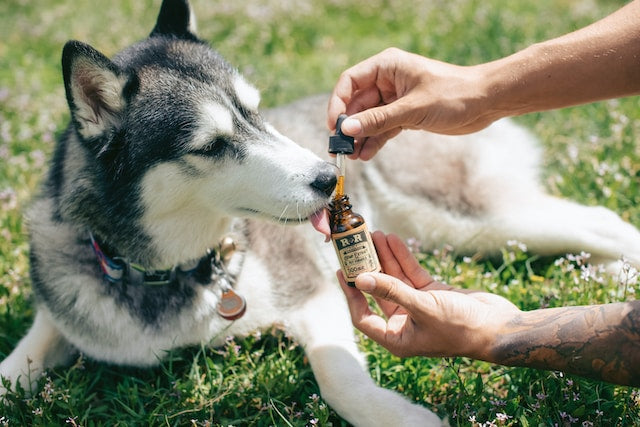In the world of canine health, the conversation often turns to the use of probiotics and antibiotics. As a pet owner, understanding the differences between these two, their benefits, and when they should be used can significantly impact your dog's overall health and wellbeing. This comprehensive guide will explore the roles of probiotics and antibiotics, providing insights into how they work, their benefits, and the best practices for their use. With expert input and evidence-based information, we aim to empower dog owners to make informed decisions about their pets' health.
Understanding Probiotics and Antibiotics
Before delving into the specifics of each, it's essential to understand what probiotics and antibiotics are and their primary functions in canine health.
Probiotics: The Beneficial Bacteria
Definition and Function: Probiotics are live microorganisms that provide health benefits when consumed in appropriate amounts. In dogs, they are primarily used to maintain a healthy balance of gut flora. This balance is crucial for optimal digestion, nutrient absorption, and a strong immune system.
Sources of Probiotics: These beneficial bacteria are naturally found in certain foods like yogurt and fermented vegetables. However, the most consistent and concentrated source comes from supplements. Pupps’ Pre & Probiotic Treats, for example, are specifically formulated to support canine gut health (find them here). These treats contain a blend of beneficial bacteria strains tailored for dogs, ensuring that your pet receives a controlled and sufficient amount of probiotics.
Antibiotics: The Bacterial Fighters
Definition and Function: Antibiotics are drugs used to fight bacterial infections. They work by killing or inhibiting the growth of bacteria, making them crucial in treating various infections in dogs, from skin conditions to gastrointestinal issues.
Understanding the Use: It's vital to note that antibiotics are only effective against bacterial infections and not viral illnesses. Also, their indiscriminate use can disrupt the natural balance of the gut microbiome, leading to a range of digestive issues. This disruption underscores the importance of using antibiotics judiciously and under veterinary guidance.
Comparing Probiotics and Antibiotics
The key difference between probiotics and antibiotics lies in their primary functions and effects on the dog's body. While antibiotics are designed to eliminate harmful bacteria, probiotics aim to support and replenish beneficial gut flora.
Purpose of Use: Probiotics are generally employed as a preventive measure or to support overall gut health, especially after an illness or antibiotic course. Antibiotics, on the other hand, are prescribed to treat specific bacterial infections.
Effect on Gut Health: One of the common side effects of antibiotic use in dogs is gastrointestinal upset, including diarrhoea and vomiting. This is due to antibiotics' tendency to disturb the balance of good and bad bacteria in the gut. Probiotics can help restore this balance, promoting a healthy digestive system.

The Role of Probiotics in Dog Health
Probiotics play a crucial role in maintaining your dog's health, especially concerning their digestive system and immune function. Here's an in-depth look at the benefits and applications of probiotics in canine wellness.
- Enhancing Digestive Health
Gut Flora Balance: Probiotics contribute to a balanced gut microbiome, which is essential for proper digestion and nutrient absorption. A healthy gut flora aids in breaking down food, extracting nutrients, and producing vitamins necessary for your dog's overall health.
Preventing Gastrointestinal Issues: Dogs with a balanced gut microbiome are less likely to suffer from common gastrointestinal issues like diarrhea, constipation, and gas. Probiotics can help prevent these issues by maintaining a healthy balance of gut bacteria.
Aiding in Recovery: After a course of antibiotics or a gastrointestinal upset, probiotics can help restore the balance of good bacteria in your dog's gut, speeding up their recovery.
- Boosting the Immune System
Gut-Immune Connection: A significant portion of the immune system is housed in the gut. A healthy gut microbiome, supported by probiotics, plays a vital role in developing and maintaining a strong immune response.
Fighting Infections: With a strong immune system, dogs are better equipped to fight off infections and recover more quickly from illnesses.
- Managing Allergies and Skin Conditions
Allergy Reduction: Probiotics may help manage allergies in dogs by enhancing the gut-immune system interaction and reducing inflammatory responses.
Improving Skin Health: Healthy gut flora can also impact skin health. Dogs with balanced microbiomes often have healthier skin and coats, potentially reducing the incidence of skin allergies and irritations.
- Supporting Overall Wellbeing
Behavioural Benefits: There's emerging evidence suggesting that a healthy gut can positively impact a dog's mood and behaviour, potentially reducing anxiety and stress-related behaviours.
Long-term Health: Regularly supplementing your dog's diet with probiotics can contribute to their long-term health, potentially reducing the risk of certain chronic conditions.
Pupps’ Pre & Probiotic Treats: Ideal for Maintaining Gut Health
Pupps' Pre & Probiotic Treats are specifically formulated to support your dog's gut health. These treats contain a blend of carefully selected probiotic strains, ensuring your dog receives the right balance of beneficial bacteria.
Easy to Administer: These treats are designed to be palatable and easy to incorporate into your dog's daily diet.
High-Quality Ingredients: Pupps prioritises the use of high-quality, dog-safe ingredients in all its products, ensuring that your pet receives the best care.
FAQ Section
How often should I give my dog probiotics?
Answer: The frequency can vary depending on the specific product and your dog's health needs. For Pupps’ Pre & Probiotic Treats, follow the recommended dosage on the package or consult your vet for personalised advice.
Can puppies have probiotics?
Answer: Yes, probiotics can be beneficial for puppies, particularly in establishing a healthy gut microbiome early in life. However, it's essential to choose a probiotic supplement suitable for puppies and to consult with a veterinarian before starting any new supplement.
Are probiotics helpful for dogs with sensitive stomachs?
Answer: Absolutely. Dogs with sensitive stomachs can particularly benefit from probiotics, as they help to stabilise the gut environment and improve digestion.

Antibiotics and Their Impact on Dogs
While antibiotics are essential in treating bacterial infections in dogs, it's important to understand their effects and use them responsibly. This section explores the role of antibiotics in canine health, highlighting both their benefits and potential drawbacks.
- Treating Bacterial Infections
Effective Treatment: Antibiotics are crucial for treating a range of bacterial infections in dogs, such as urinary tract infections, skin infections, respiratory infections, and certain gastrointestinal issues. They work by targeting and eliminating the harmful bacteria causing the infection.
Specificity of Treatment: Different antibiotics target different types of bacteria. Therefore, it's important for veterinarians to diagnose the specific infection accurately to prescribe the most effective antibiotic.
- Risks and Side Effects of Antibiotic Use
Disruption of Gut Flora: One of the most common side effects of antibiotic use in dogs is an upset in the balance of gut microbiota, leading to issues like diarrhea, vomiting, and loss of appetite.
Development of Antibiotic Resistance: Misuse or overuse of antibiotics can lead to antibiotic-resistant bacteria, a significant health concern. It's crucial to use antibiotics as prescribed and complete the full course, even if symptoms improve.
- Balancing Antibiotics with Probiotics
Mitigating Side Effects: Administering probiotics alongside or following a course of antibiotics can help mitigate the negative impact on the gut flora. Probiotics can replenish the beneficial bacteria that antibiotics may deplete.
Timing of Administration: It's recommended to give probiotics a few hours apart from antibiotics to ensure that the beneficial bacteria in the probiotics are not destroyed by the antibiotics.
- Considering Alternatives and Supportive Care
Non-Antibiotic Treatments: In some cases, non-antibiotic treatments may be effective, especially for minor infections or as preventive measures.
Supportive Care: Alongside antibiotics, supportive care such as a balanced diet, adequate hydration, and rest play a crucial role in your dog's recovery.
Choosing the Right Option for Your Dog
Determining whether your dog needs probiotics, antibiotics, or both depends on their specific health situation. This decision should always be made in consultation with a veterinarian.
Consult a Veterinarian: Your vet can diagnose the health issue and recommend the appropriate treatment, whether it’s probiotics, antibiotics, or a combination of both.
Consider Your Dog’s Overall Health: Factors like age, breed, existing health conditions, and current medications all play a role in determining the best approach to your dog’s health care.
FAQ Section
How can I tell if my dog needs antibiotics?
Answer: Symptoms like fever, lethargy, unusual discharge, and areas of redness or swelling can indicate a bacterial infection requiring antibiotics. Always consult a veterinarian for a proper diagnosis and treatment plan.
Can long-term use of antibiotics harm my dog?
Answer: Long-term or repeated use of antibiotics can lead to antibiotic resistance and other health issues. It’s essential to use antibiotics only as prescribed by a vet.
Should I give my dog probiotics after an antibiotic course?
Answer: Yes, it's generally a good idea to administer probiotics after an antibiotic course to help restore the balance of gut bacteria.
Pupps’ Pre & Probiotic Treats: A Closer Look
As a pet owner, ensuring that your dog receives the right nutrition and supplements is crucial. Pupps’ Pre & Probiotic Treats offer a convenient and effective way to support your dog's gut health. Let's explore what makes these treats a great choice.
- Ingredients and Benefits
Probiotic Strains: These treats are formulated with specific strains of beneficial bacteria, such as Lactobacillus and Bifidobacterium, known for their positive effects on canine gut health.
Prebiotic Fibre: In addition to probiotics, the treats contain prebiotic fibres which promote the growth of beneficial gut bacteria and enhance the overall effectiveness of the probiotics.
Nutritional Value: Besides promoting gut health, the treats are designed to be nutritionally balanced, contributing to your dog’s overall diet.
- How to Use
Dosage and Frequency: The treats come with guidelines on dosage based on your dog’s size and weight. It's important to follow these instructions or consult with your vet for a tailored approach.
Introducing to Your Dog’s Diet: Gradually introduce these treats into your dog’s diet to allow their digestive system to adjust.
- Customer Reviews and Testimonials
Hearing from other pet owners can provide valuable insights into how these treats have benefited their dogs. Many have reported improvements in digestion, reduced gastrointestinal issues, and overall better health in their pets.
FAQ Section
Are these treats suitable for all dog breeds?
Answer: Yes, Pupps’ Pre & Probiotic Treats are suitable for most dog breeds. However, it's always best to consult with a vet, especially for breeds with specific dietary requirements.
Can these treats be used alongside other medications?
Answer: Generally, these treats can be used with other medications, but it's advisable to consult with your vet, as they can provide guidance based on your dog’s specific health needs and medication regime.
What are the signs that the probiotic treats are working?
Answer: Signs of effective probiotic supplementation include improved digestion, regular bowel movements, and a reduction in gastrointestinal issues like gas and bloating.
The debate between probiotics and antibiotics in canine health is not about choosing one over the other, but rather understanding how each plays a vital role in different scenarios. Probiotics are key in maintaining gut health and boosting immunity, while antibiotics are essential for treating specific bacterial infections. Responsible use of both, under veterinary guidance, can ensure the best health outcomes for your dog. Pupps’ Pre & Probiotic Treats offer a convenient way to support your dog’s gut health, contributing to their overall wellbeing.
Remember, the journey to optimal health for your dog is a partnership between you, your pet, and your veterinarian. By staying informed and proactive in your dog's health care, you can ensure they lead a happy, healthy life.
Practical Tips for Administering Probiotics and Antibiotics in Canine Health
Ensuring the health and wellbeing of our canine companions often involves the use of probiotics and antibiotics. However, the effectiveness of these treatments largely depends on their correct administration. Here, we delve into the best practices for integrating these vital elements into your dog’s health regimen.
Best Practices for Probiotics
Integrating Probiotics into Your Dog’s Diet: Introducing probiotics should be a gradual process. Begin with small doses and gradually increase to the recommended amount. This allows your dog's digestive system to adjust without causing discomfort.
Choosing the Right Probiotic: Not all probiotic supplements are created equal. Look for products specifically formulated for dogs, like Pupps’ Pre & Probiotic Treats, which contain strains beneficial for canine gut health. These treats are designed to be palatable and convenient to administer.
Monitoring Your Dog’s Response: Keep an eye on your dog’s reaction to the probiotics. Improvements in digestion and overall health can often be seen, such as more regular bowel movements and increased energy levels. However, if you notice any adverse reactions like excessive gas or diarrhoea, consult your veterinarian.
Regular Administration: Probiotics work best when given regularly. Establish a routine for probiotic administration, either as a daily supplement or as directed by your vet.
Responsible Use of Antibiotics
Following Veterinary Guidance: Always use antibiotics as prescribed by your veterinarian. This includes administering the correct dose at the right times and completing the entire course of treatment, even if your dog appears to be better.
Understanding Antibiotic Purpose and Duration: Be aware that antibiotics are specifically for bacterial infections. Using them for viral infections is ineffective and can contribute to antibiotic resistance.
Monitoring for Side Effects: While antibiotics are generally safe, they can cause side effects in some dogs. These may include loss of appetite, diarrhoea, or vomiting. If you observe any of these symptoms, or if your dog's condition seems to worsen, contact your veterinarian immediately.
Balancing Antibiotics with Probiotics: Considering the impact of antibiotics on gut health, supplementing your dog’s diet with probiotics during and after antibiotic treatment can help maintain a healthy gut flora. Ensure there’s a gap of a few hours between administering antibiotics and probiotics to prevent the antibiotics from eliminating the beneficial bacteria in the probiotics.
Administering probiotics and antibiotics responsibly is key to maximising their benefits while minimising potential risks. By integrating probiotics thoughtfully into your dog's diet and adhering to veterinary guidelines for antibiotic use, you can play a crucial role in maintaining and enhancing your dog’s health. Remember, every dog is unique, so it’s important to tailor these practices to your dog’s specific needs and always consult with a veterinarian for personalised advice.
Case Studies and Real-Life Success Stories: The Impact of Probiotics and Antibiotics on Canine Health
The theoretical benefits of probiotics and antibiotics are well-documented, but real-life cases often provide the most compelling evidence of their effectiveness. In this section, we explore some success stories and case studies that highlight the transformative impact these treatments can have on canine health.

Probiotic Successes: Enhancing Health and Vitality
Case Study: Bella, the Sensitive Stomach Spaniel
Background: Bella, a Cocker Spaniel, suffered from chronic digestive issues, including irregular bowel movements and occasional diarrhoea.
Intervention: Her vet recommended a daily probiotic supplement, specifically Pupps’ Pre & Probiotic Treats.
Outcome: Within a few weeks, Bella showed significant improvements. Her bowel movements became regular, and her overall energy levels increased. Her owner also noted a visible improvement in her coat condition.
Testimonial: Max, the Golden Retriever with Allergies
Issue: Max struggled with seasonal allergies that caused skin irritation and digestive discomfort.
Solution: Alongside a tailored diet, Max was given probiotics specifically designed for dogs.
Result: The probiotics, over time, helped alleviate his allergy symptoms, reduced his skin irritations, and improved his digestive health.
Antibiotic Necessities: Battling Bacterial Infections
Case Study: Charlie, the Labrador with a Skin Infection
Problem: Charlie developed a bacterial skin infection, evident through red, inflamed patches on his skin.
Treatment: A course of antibiotics was prescribed by his vet, alongside topical treatments.
Recovery: The infection cleared up within a couple of weeks, with Charlie returning to his playful, active self. His owner was advised to monitor his skin closely for any future issues.
Testimonial: Daisy, the Dachshund with a UTI
Condition: Daisy was diagnosed with a urinary tract infection (UTI), showing symptoms of discomfort and frequent urination.
Action: After confirming the diagnosis, her vet prescribed a specific antibiotic regimen.
Healing Process: Daisy’s symptoms improved significantly within a few days, and a follow-up test confirmed the infection was gone. Her owner was educated on signs to watch for to catch any future UTIs early.
These case studies and testimonials underscore the importance of probiotics and antibiotics in managing various health issues in dogs. They highlight not only the necessity of these treatments in specific circumstances but also the importance of veterinary guidance in determining the best course of action for each individual dog. Through these real-life examples, we see the tangible benefits that appropriate use of probiotics and antibiotics can bring to our canine companions.
Pupps’ Commitment to Canine Health: A Dedication to Quality and Innovation
At the core of Pupps’ philosophy is a deep commitment to the health and wellbeing of dogs. This commitment is evident in the meticulous care and attention to detail that goes into every product, particularly their Pre & Probiotic Treats. Let’s explore how Pupps upholds its dedication to canine health through quality standards and ongoing research and development.
Quality and Safety Standards in Product Formulation
Sourcing of Ingredients: Pupps places great emphasis on selecting high-quality, natural ingredients. The ingredients for their Pre & Probiotic Treats are sourced from reputable suppliers who meet stringent quality standards.
Formulation Process: Each product is formulated by veterinary nutrition experts to ensure that it meets the nutritional needs of dogs. This process involves balancing the right strains of probiotics with other beneficial ingredients to maximise health benefits.
Safety Testing: All products undergo rigorous safety testing. This includes testing for contaminants and ensuring that each batch of treats meets the high standards set by the company for safety and efficacy.
Transparency and Compliance: Pupps is committed to transparency in its manufacturing processes and complies with all relevant regulations and guidelines. This commitment extends to clear, honest labelling so pet owners can be fully informed about what they are giving their dogs.
Ongoing Research and Development
Staying Informed on Canine Health Trends: Pupps invests in staying ahead of the curve when it comes to canine health research. By monitoring the latest scientific developments, they can adapt their products to the evolving understanding of what contributes to canine health and wellness.
Product Innovation: Ongoing research and development are key to Pupps’ approach. They continually explore new formulations and improvements to existing products, ensuring they offer the best possible solutions for canine health issues.
Collaborations with Veterinarians and Scientists: Pupps collaborates with veterinary professionals and scientific researchers to ensure that their products are not only effective but also ahead in terms of innovation and efficacy. These collaborations are vital for developing new products and refining existing ones.
Feedback Loop with Customers: Customer feedback is an integral part of Pupps’ research and development. By listening to the experiences of pet owners, Pupps can make informed decisions about product adjustments and new product lines.
Pupps' unwavering commitment to canine health is the driving force behind their high-quality, innovative products. Through rigorous quality control, continuous research and development, and a deep understanding of canine health needs, Pupps is dedicated to enhancing the lives of dogs and their owners. Their Pre & Probiotic Treats are a testament to this commitment, embodying the company's dedication to providing the best in canine nutrition and health support.
Navigating the Intersection of Probiotics, Antibiotics, and Canine Wellbeing
As we reach the end of our in-depth exploration of probiotics and antibiotics in canine health, it's important to reflect on the critical insights and takeaways from this discussion. Our journey through the roles of probiotics and antibiotics, their impact on dogs, and the exemplary commitment of Pupps to canine health provides a holistic understanding of how to best care for our furry companions.
Key Takeaways
Balanced Approach: The effective use of probiotics and antibiotics is not about choosing one over the other but understanding the specific roles each plays in maintaining and restoring health. While probiotics support gut health and enhance immunity, antibiotics are crucial for treating bacterial infections.
Responsible Use: The importance of responsible administration cannot be overstated. Whether it’s the gradual introduction of probiotics or the careful adherence to antibiotic prescriptions, the health of our dogs depends on our informed and attentive approach to their care.
Veterinary Guidance: Always seek the advice of a professional. Veterinary expertise is invaluable in diagnosing health issues, recommending the right treatment, and providing guidance on the use of supplements like Pupps’ Pre & Probiotic Treats.
Pupps’ Dedication: Pupps’ unwavering commitment to quality and innovation in canine health shines through in their products. Their focus on rigorous safety standards, ongoing research, and customer feedback ensures that their offerings, like the Pre & Probiotic Treats, are at the forefront of canine wellness solutions.
A Healthy Future for Our Canine Friends
The health and happiness of our dogs are paramount. As pet owners, we are continually seeking ways to improve their lives. The information shared in this blog aims to empower you with knowledge and confidence in making health decisions for your pets. Remember, a proactive approach to canine health, encompassing both preventative measures like probiotics and necessary medical interventions like antibiotics, can lead to a more vibrant, healthy life for our beloved dogs.
In closing, let's remember that the journey of canine care is one of love and commitment. By staying informed, choosing quality products like those from Pupps, and working closely with veterinary professionals, we can ensure our dogs enjoy the healthiest, happiest lives possible.




Leave a comment
This site is protected by hCaptcha and the hCaptcha Privacy Policy and Terms of Service apply.